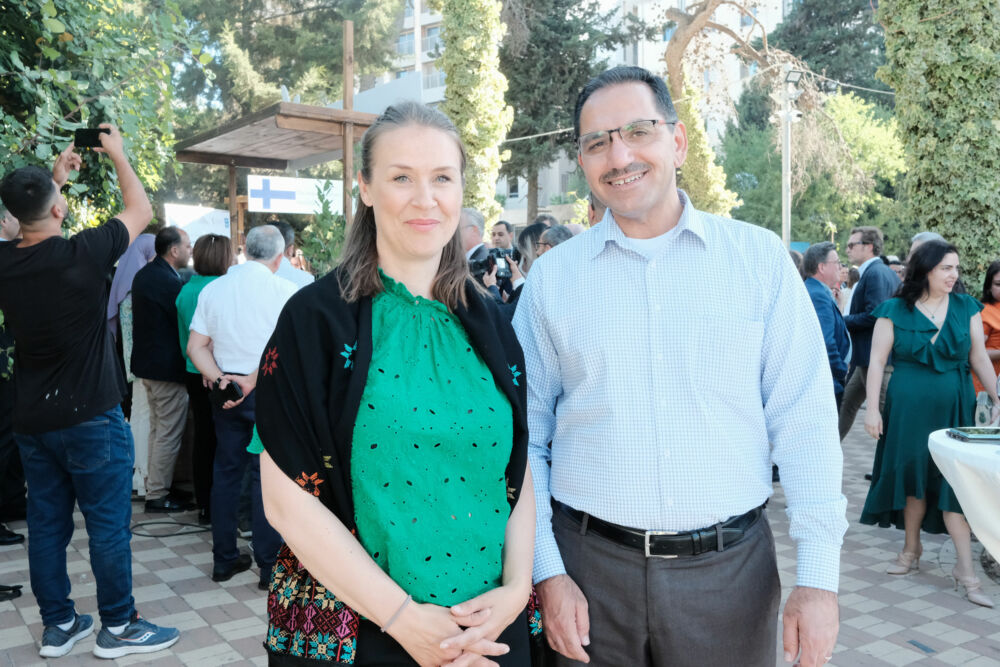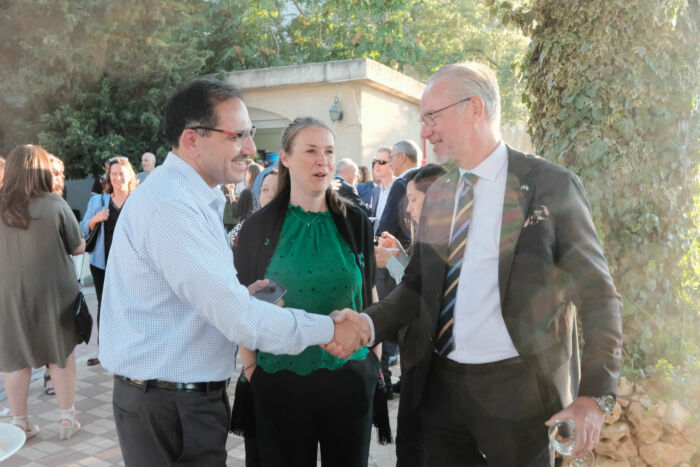Meet Khaled Daoudi, new country manager for We Effect Palestine
Date
June 19, 2023
Anna Erlandsson and Khaled Daoudi. Photo: Robert Englund
Hello Khaled and welcome to We Effect, or I should say welcome back!
Thank you! I am glad to be back.
For some you are a familiar face since you have worked for We Effect before, but for most of us you are a new colleague. Tell us a little bit about yourself!
Sure. My name is Khaled and I am 53 years old Palestinian from Jerusalem. I have a family with 4 children, 1 son, 3 daughters. And as you mentioned I used to work for We Effect several years ago.
Before I started working in development cooperation, I studied mechanical engineering and graduated with a BA in engineering from Berkley, then I took my MBA at San Francisco State University. After school I went back to Palestine and started working within the cooperative movement here in 1998. Back then I facilitated the implementation of the Swedish-Palestinian cooperative development program.
What was the cooperative development focusing on back then?
Well, it was a collaboration between Palestinian and the Swedish cooperative movements that mainly consisted of projects aimed at capacity building for cooperative businesses. For example, we organized so that ten Palestinian young trainees got to go to Sweden and get some education and training that they then brought back to Palestine to train other farmers and businesses in cooperative organization.
And from there you went on to establish We Effect in Palestine?
Yes! The projects I worked with were already partly funded by LRF and KF, then they decided to open an office in Palestine in 2003 with a focus on agriculture, housing and consumer cooperatives. I went on to work there as country manager until 2010.

So you worked with cooperative development in Palestine for 12 years, then what happened?
Yes, after 12 years I felt I needed to try something new, so I left We Effect to work for the European Commission, Department for Humanitarian AID (DG-ECHO) office in Jerusalem, but I didn’t feel self-realization and I didn’t feel that I was contributing much to the development in Palestine. So I quickly moved on to work for TAAWON, a big Swiss NGO, where I worked between 2011-2017. Then I worked for Oxfam for a while as manager of a market system program focusing on value chain development for agriculture. And now I close the circle by returning to We Effect.
So, you once started up We Effect in Palestine 20 years ago. Now when you are back, what have changed?
Haha, well I’m still very new here. I only started one week ago, but I can see that a lot has changed. The programs have gotten bigger and broader. Back when I was here last, we still did humanitarian work. Now we work only with development and with a much broader and more diversified portfolio of partnerships.
I also sense that there might be some deviation from the core mission of We Effect. Before we only worked with the development of the businesses within the cooperative movement. Back then we only talked about cooperative principles. Now, we also talk about other things like food security, climate change and gender mainstreaming. It has grown and become broader. I also feel that we as an organization have become much more vocal now. That is good!
However, in the end, cooperatives are businesses and cooperative development at its core is to support the capacity building and development of these businesses. That is what leads to the economic enrichment of our rights holders. So, it is important that we don’t lose touch with these central cooperative principles.
We have had a couple of challenging years, both globally and in Palestine. Looking into the future, what are the most pressing issues för Palestinian cooperatives?
As with all development in Palestine, the occupation is the biggest challenge. If it wasn’t for the conditions that this occupation is creating for Palestinian people, organizations and businesses, development aid would probably not be needed here at all. And the new Israeli settlements only makes matters worse. Many farmers lose some or all of their land to new settlements, and important resources like water become scarce when a large portion of it gets redirected to the settlers. This will become an increasingly pressing issue as climate change makes our land dryer and more difficult to farm on.
But we also have other challenges here. We need to build more resilient and self-sufficient businesses. In a way I feel that we have become “lazy” by relying on foreign aid here. Now we need working institutions in Palestine and stronger cooperative organizations that are less reliant on foreign support.
And as mentioned, climate change will be a huge challenge. Palestinians are not the big polluters on the West Bank, the Settlers are. However, that does not mean we don’t need to do our part to contribute to the fight against climate change. There is a lot of technology out there to minimize the use of water and to get bigger and steadier yields in spite of the warmer climate. Now we need to take advantage of this new tech. It would be good both for the climate and the farmers’ profitability.
Any other challenges?
Yes! Palestinians are culturally addicted to education, which of course is a good thing. Parents are very keen on having their kids finish their educations and pursue higher education and Palestinians are comparatively well educated. But the lack of political solution in Palestine and worsening economy means all these well-educated young adults can’t get a job. For example, we have thousands of dentists that can’t find employment. The same thing is happening with entrepreneurs trying to create start-ups. The restricted mobility and the economic situation are not great for entrepreneurship.
At the same time, we notice how the young generation don’t want to be involved with the hard work of agriculture in the same way as their parents. We need to find ways to rejuvenate the agriculture sector by making it more profitable and by reconnecting young adults with their lands and the skills required to farm it. This is of vital importance if Palestine is to be more self-reliant and resilient in the future.
Lastly, as you know Sweden has allected a new government which have lowered the aid budget for Palestine. In what way do you think this will affect your work and the work of other CSO:s in Palestine?
It will of course affect us and create new challenges – you get less for five dollars than you do for ten. Budget cuts will affect all rights holders. But the strength of the cooperative movement is that we have our cooperative partners besides our institutional donors. I also think we must get more active in finding new income streams, so we can become more robust and resilient. Despite the challenges with decreasing funding, I hope that we can at least continue at the same level as we operate today.